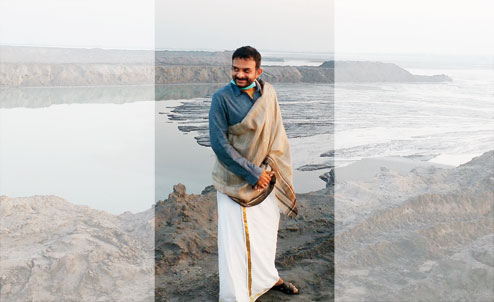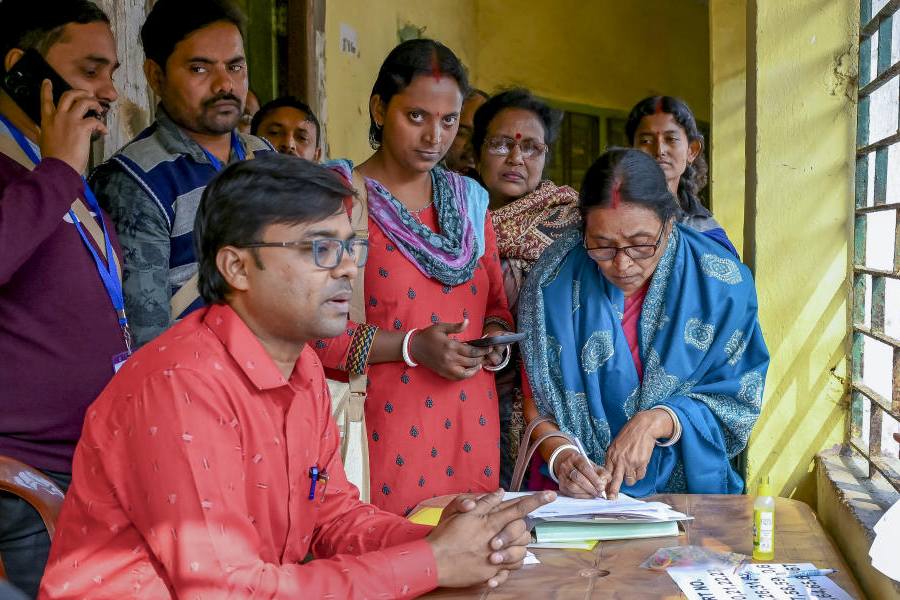
He has come a long way in a rather short span of time. From being called a "disrupter" and an "arrogant attention-seeker", he is now being hailed as the "democratiser" of Carnatic music.
None of that seems to matter to T.M. Krishna. "These are all traps. I don't want to fall into any one of them," says Krishna or TMK, as he is popularly known. Unlike a regular Carnatic musician performing before a steeped-in-tradition audience at a concert hall in Chennai's Mylapore or some such, Krishna has been taking his music to the hoi polloi.
The 41-year-old can be seen regaling listeners in fishermen's kuppams (hamlets) along the beaches of Chennai, at railway stations and on city transport buses. "Certain art forms can be very elitist. They never go beyond their spaces. We wanted to move beyond these artificial boundaries," says the man.
The "we" is a reference to his collaborations with other like-minded musicians across genres. Krishna also does solo shows.
According to him, performing on buses is the most difficult bit. "It is very uncomfortable. There is no security, no stage and no audience as such, because people keep getting on and off. But credit goes to our young musicians who took up the challenge... People are requesting more such concerts."
Dressed in a grey T-shirt and white pyjamas, Krishna looks relaxed in his apartment in Chennai's Alwarpet. He has just returned from a concert in Kochi. The last two years, he has been giving the much-awaited Chennai Music Season, held from December to January, a miss.
His legions of rasikas (connoisseurs) can't wait to see him, but Krishna isn't desperate either for the buzz or for the adulation. "Art is not beyond the real. The beauty of art is greatest when it is grounded in the real, not when it is grounded in some mumbo-jumbo," he says.
At first, Krishna, too, followed the tightly-knit Carnatic kutcheri (concert) format - a set sequence and duration for several musical units - handed down from generation to generation. But that did not last long.
Next, he tinkered with the format and eventually began questioning the Brahminical domination of the art form and its utter lack of diversity.
Not content even with that, Krishna started organising concerts at Urur Olcott kuppam, a fisherman's village off Elliot's beach in Chennai. The aim was to "remove the hierarchies" that exist within the art world and "liberate the art forms".
Krishna's admirers say he has changed the way people perceive Carnatic music outside the conservative fold and the way classical music lovers regard folk and other forms of music.
In recognition of his "forceful commitment as an artist and advocate to art's power to heal India's deep social divisions", he was awarded the 2016 Magsaysay Award in the Emergent Leadership category.
Born into an upper-class Brahmin family, Krishna was always encouraged to speak his mind. And when he decided to take on the mighty Carnatic hierarchy, he says he was prepared for the consequences. "I did expect a strong a reaction, and I thought I was prepared for it. But when it happened, it felt different," he laughs.
During the initial days he felt alone in his fight. "Then I realised that people don't see the world the way you see it. Even I have evolved. Fifteen years ago I probably wouldn't have agreed with what I am saying today."
Krishna continues to speak his mind through his online and newspaper articles. No subject is taboo. He recently opposed the inauguration of the 112-foot bust of "Adiyogi" (Shiva) at the Isha Yoga Center in Coimbatore by the Prime Minister, as it was allegedly built without getting the requisite land and environmental clearances. He says, "I had also opposed Sri Sri Ravi Shankar's event in Delhi on the banks of the Yamuna. The Prime Minister was wrong in inaugurating both events as neither had all the necessary clearances."
Equally candid about his political views, the singer says he is very clear he has nothing in common with the political dispensation of the day - the BJP and the RSS. "I am all for a politics of inclusiveness. This is not what they practise."
On a lighter note, he is an avid follower of cricket and has a piece in the Wisden India Almanack 2017 on the aesthetics of the game. "Aesthetics is not something that you and I find beautiful. It is beyond the victories, losses and scoreboards. Aesthetics is something that goes into the idea of the form itself," he says.
Who knows, as in the case of Carnatic music, he may well change the way people look at cricket.











